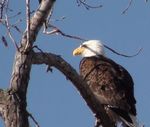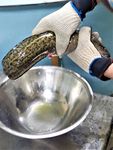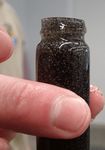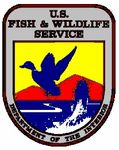Garrison Dam National Fish Hatchery Complex
←
→
Page content transcription
If your browser does not render page correctly, please read the page content below
Garrison Dam National Fish
Hatchery Complex
Restoring America’s Fisheries
“We work with our partners and engage the public, using a science-based approach,
to conserve, restore and enhance fish and other aquatic resources for the continuing
benefit of the American people.” December / January 2020
Fish Culture
The walleye YY study in our isolation room is gaining attention. Local televison picked up on the story
with the headlines ‘Raising walleye-males only.” We are working with Dan Schill of the Idaho
https://www.minotdailynews.com/life/outdoors/2021/01/raising-walleye-males-only/
Department of Fish and Game to develop the broodstock at the request of Western Association of Fish
and Wildlife Agencies (WAFWA). The project is progressing with hopes of acquiring permission from
FDA to use estrogen laced feeds on walleye yet this Spring if NovaEel agrees to sponsor the project.
NovaEel is a Canadian based company
that produces glass eels for aquaculture
with an interest in the production of all
female eels. Currently we are holding 700
advanced fingerling walleye averaging 7.1
inches at 11.2 fish per pound. With this
lot of fish we will be gaining information
on growth, feed rates and acceptability,
density and techniques to predict future
capabilities for YY broodstock
development.
The routine coldwater propagation activities are underway with 100,000 Shasta Rainbow Trout eggs
received from Ennis NFH now on feed as well as the 30,000 Brown
Trout from Saratoga
NFH and 30,000
Hot Creek Rainbow
Trout from the
Dubois State Fish
Hatchery in
Wyoming. Our
Chinooks have also
outgrown their tanks
and a portion
redistributed into
one of the
hatchery’s 8 X 80
raceways.Burbot spawning was a success with 652,000 eggs collected from five females
using one to one crosses over the course of about a week at
the end of January. The eggs will be incubating into
March with hopes of stocking a hatchery pond with sac fry
in early April. Yes, you read that right, spawned in
January and still sac fry in April. Burbot spawning
temperature is in the mid 30's and incubation at ambient
water temperatures during a North Dakota winter doesn’t
add many temperature units. To give you an idea on the
size of the eggs, they are right at 850 eggs per ml. With a
ml being about 20 drops - that would be 42 eggs per drop
of water. Once hatched they are a little smaller with 24,000
larvae fitting in this 20 ml vial when topped off!
Upcoming Activities
Upper Basin Pallid Sturgeon Workgroup virtual meeting
Dakota Chapter AFS virtual meeting
Red River Lake Sturgeon Team updates
Installation of a Nanobubble generator and oxygen concentrator in the Salmon Building
Public Use
The North Country Trail Association’s Central
Flyway Chapter highlighted the hatchery’s trails
with a ‘self-guided hike’ from January 29
through February 7, 2021. The Chapter included
a page long introduction to the hatchery’s trails
is many of the region’s newspapers and
television to get the attention of the public and
encourage the use of the North Country National
Scenic Trails. A scavenger hunt for kids 12 and
under was
included in the
promotion with
prizes for all
who completed the hike and scavenger hunt. The North Country
Trail is the longest footpath in the United States stretching over
4,700 miles from central Vermont to Lake Sakakawea in North
Dakota with a goal of connecting the Appalachian Trail with the
Lewis and Clark Trail. The trail at the hatchery meanders through
the cottonwoods along the Missouri River where at this time of
the year Bald Eagles are seen routinely and open water attracts
thousands of wintering ducks and geese.
https://www.kxnet.com/news/local-news/north-country-trail-associations-central-flyway-chapter-
hoping-to-redraw-attention-to-north-dakotas-many-trail-systems/Maintenance
The Valley City National Fish Hatchery purchased a pool
heater to be installed in the holding house which can
provide the appropriate water temperatures when
incubating eggs. This will allow staff to hold eggs at
different temperatures to space out hatching times so
ponds can be stocked in intervals to facilitate harvest and
shipping schedules. This will also allow the hatchery to
stock ponds earlier so they can be harvested before zebra
mussel veligers are present in the source water
precluding further stockings in zebra mussel free waters.
Additionally, the hatchery picked up a used egg battery
from Gavin’s Point NFH to install in the holding house.
After remodeling the aluminum tanks, the setup was put
back together and secured in the building. Along with
installing the new egg battery, the staff is retrofitting the existing egg battery with the same
temperature control and drain line modifications. New
overhead plumbing will supply the egg batteries with
cold and warm water.
At Garrison Dam NFH several projects were initiated
including installing a center console on the new F-250.
In spite of several attempts to have the center console
included in the GSA order and repeated requests to
confirm that it was in fact part of the package, the truck
arrived, you guessed, without one.
Our UV
disinfection system maintains a set dosage with the
assistance of an attached turbidity meter. The turbidity
meter in turn requires regular calibration using distilled
water which means frequent trips to purchase water. A new
water filtration system was installed by the staff to produce
our own distilled water through filtration which provides
ever ready distilled water at our disposal.
A nanobubble generator was installed in the Sturgeon
Building to facilitate nitrogen removal. Total dissolved gas
levels at our facility provide a constant source of stress for
all our intensively cultured fish species. Nanobubble
injection shows promise for correcting the issue while
infusing the water with nanobubbles, described as 2500
times smaller than a grain of salt.To monitor the effects of nanobubble injection we have installed a HydroVu monitoring system
that works in conjunction with In-Situ water monitoring probes to provide us with cloud based
water quality information and alarming. With real time monitoring of oxygen levels, temperature
and TDG values we have confidence in assessing overall water quality on a continual basis. The
alarming feature will enable hatchery staff to set specific water
parameters on a tank by tank basis to alert by text, phone or email
when alarming conditions exist. Events like temperature spikes,
notifications when water valves have been shut inadvertently, or
even chronic low oxygen levels that may exist during periods of tank
cleaning are recognized and corrected with the system. A wall
mounted Mace FloPro is used as our telemetry device to collect and
display water quality from the In-Situ probes and transmit the data to
the HydroVu which in turn can be monitored remotely by your PC or
smart phone. Technology today, what ever happened to the Weiss
Saturometer and Winkler titration?
After forty years of operation above the fish tanks, the old
North Star feeders were retired and replaced with much
quieter Whisper feeders. The new feeders are taking the fun
out of the school tours, with no opportunity to startle the kids
with the shotgun slamming of the feeders as they drop feed to
the hungry trout below. Which of us as fish culturists hasn’t
been jolted out of the mind numbing morning of fish tank
cleaning by the sound of these feeders?
Administrative
Fish requests for upcoming year were finalized with ND Game and Fish
Annual report was completed and sent to RO.
Pesticide Use reporting was wrapped up.
Station SOP’s for several station maintenance and propagation activities were finalized.
2020 water use reports were submitted.Production Summary
Station: Garrison Dam NFH Period Covered: October 1, 2020 Through January 31, 2021
Fish on Hand the Last Day of the Period To Date This Fiscal Year
Lot Number Number Weight Length Density Flow Weight Feed Expended Fish Shipped % Feed
(Lbs) (in) Index Index Gain Pounds Cost Number Weight Survival Conversion
RBT-SSD-20-ENN 67,945 27,061 10.6 0.37 1.14 12,297 16,800 $9,546 100 1.37
BNT-PRD-19-SAR 18,245 7,303 10.0 0.40 1.15 2,563 4,234 $2,408 95.2 1.65
RBT-HCD-20-WY 17,016 22 1.6 0.18 0.57 30 13 $18 99.8 0.42
BNT-PRD-20-SAR 20,414 18 1.3 0.17 0.54 17 11 $16 99.7 0.63
FCS-LSW-20-FR 368,393 1,942 2.6 0.22 1.22 1,791 1,127 $2,315 99.7 0.63
WAE-LSW-20-FR 700 28 5.9 0.14 0.78 28 34 $65 89.0 1.25
Totals/Averages 492,026 37,246 16,698 22,185 $14,403 1.33
Hatchery Complex Personnel Meet the Garrison Dam NFH Complex Staff
Employee Functional Title Grade Shawn Cole is the Sturgeon
Biologist for Garrison Dam NFH.
Robert Holm Project Leader GS-13
Shawn transferred from Region 1
Jerry Tishmack Fishery Biologist GS-11 to Garrison Dam NFH in
November of 2014 and has
Sean Henderson Fishery Biologist GS-11 become an integral part of our
team assisting with all of our
Shawn Cole Fishery Biologist GS-7 programs as needed. His primary
Toni Ganje Administrative Support GS-7 responsibility lies in the day to
day culture activities of both
Ben Oldenburg Fisheries Technician GS-6 Shovelnose and Pallid Sturgeon. He transitioned well from his salmonid
background into sturgeon propagation and was quick to learn operations of
Aaron Von Eschen Assistant Project Leader GS-12 the Garrison Dam NFH Complex. He also ‘inherited’ the responsibilities of
Tyler Sexton Biological Technician GS-7 Burbot culture and is working to develop intensive culture techniques for
propagation of that species. Shawn and his wife, Michelle, live on station
Paul Drabus Maintenance Worker GS-7 with their two bird dogs and is an avid hunter and fisherman.You can also read



























































